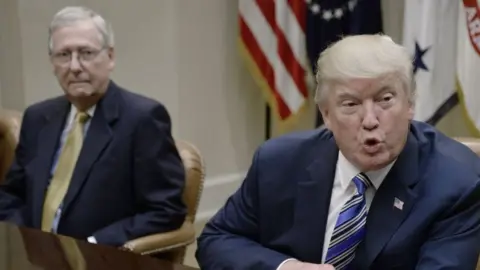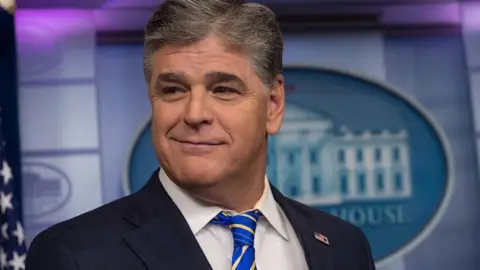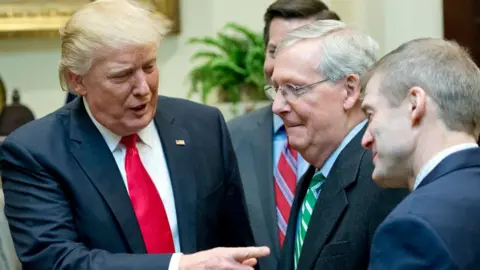Trump turns on Republican leadership
 Getty Images
Getty ImagesAttorney General Jeff Sessions can take a deep breath. Donald Trump has found a new punching bag among Republican ranks - Senate Majority Leader Mitch McConnell.
In a series of tweets and comments over the past week the president has lashed out against the top-ranking Republican in the Senate, whose attempts to shepherd legislation to repeal and replace Obama-era healthcare reforms through his chamber spectacularly failed two weeks ago.
The proximate cause of Mr Trump's ire was Mr McConnell's comment in a speech on Monday that the president may have "excessive expectations about how quickly things happen in the democratic process".
"Senator Mitch McConnell said I had 'excessive expectations', but I don't think so," the president tweeted in reply. "After 7 years of hearing Repeal & Replace, why not done?"
He followed that up with tweets saying Mr McConnell "couldn't get it done" and that he should "get back to work".
"You can do it!" he added, in a bit of chummy enthusiasm.
Then, on Thursday during a series of press events at his golf resort in Bedminster, New Jersey, the president told reporters he was "very disappointed in Mitch". He lambasted the senator for failing to get a healthcare bill to him on his "first day" in office. (What was that about "excessive expectations", again?)
When pressed, he refused to say whether he thought Mr McConnell - who has been leader of Senate Republicans since 2007 - should step down.
"If he doesn't get repeal and replace done and if he doesn't get taxes done, meaning cuts and reform, and if he doesn't get a very easy one to get done, infrastructure - if he doesn't get them done, then you can ask me that question," the president said.
Accomplishing just one of those legislative objectives, let alone all three, anytime soon will be a tall order for Mr McConnell, given the political realities in the Senate. Congress is out of session until September, at which point it will have to authorise new US debt - a political football in recent years - and pass appropriations bills that will fund government operations after 1 October.
Healthcare reform appears dead in the water - in part because, as Mr Trump has accurately pointed out, Republicans touted "repeal and replace" for seven years but were woefully unprepared to put that talk into action. Formulations for tax and infrastructure legislation are even less advanced.
While Congress could tackle the issues in 2018, traditionally little gets accomplished in midterm election years, when politicians are focused on campaigning, not legislating.
Rally around the leader
The president's recent snipes at Mr McConnell do appear to be having at least one tangible effect, however, as fellow Republican senators have rallied to the Kentuckian's side.
Texas Senator John Cornyn, a high-ranking member of the Senate Republican team, tweeted that it takes a "team effort" to enact Mr Trump's legislative priorities.
"No one is more qualified than Mitch McConnell to lead Senate in that effort," he writes.
Orrin Hatch of Utah, the longest-serving member of the upper chamber, said Mr McConnell has been "the best leader we've had in my time in the Senate".
Thom Tillis of North Carolina pointed to Mr McConnell's unprecedented efforts to seat conservative Neil Gorsuch on the US Supreme Court. Dean Heller of Nevada, the most at-risk Republican senator facing re-election next year, said he looked forward to Mr McConnell's "leadership" on tax reform.
McConnell's critics
Outside of the halls of Washington, however, all is not as rosy for the Republican leader. Sean Hannity of Fox News - who clearly has the president's ear - presaged Mr Trump's comments with his own Twitter blast on Wednesday night.
"YOU are a WEAK, SPINELESS leader who does not keep his word and you need to Retire!" the news host tweeted.
Allen West, the congressman turned conservative gadfly, also chimed in that day, saying Mr McConnell was an "abject failure".
 Getty Images
Getty Images"We were under a delusion that the Republican Party would actually do what's right," he wrote on his website. "We know the progressive socialists of the Democrat Party will not. We're left with no other recourse: remove those who lie, deceive and betray the will of the people."
Roy Moore, a former state judge challenging incumbent Alabama Senator Luther Strange - Mr McConnell's handpicked candidate - in a special election primary this month, has railed against the "McConnell slime machine" and touted his campaign as a means to "send a message" to the majority leader.
McConnell-bashing isn't unique to this particular moment in history, of course. During the 2015-16 Republican presidential primary season, swipes at the majority leader were a regular applause line for candidates like Ted Cruz, who once called him a "very effective Democratic leader".
Mr McConnell, like the turtle his critics often compare him to, has a tough shell, however, and continues on his slow, steady course long after firebrands like Mr Cruz have lost their heat.
Criticism has consequences
Now it's Donald Trump's turn to go after the veteran senator. The strategy could come at a cost, however. While the president may be trying to show his independence from members of a Washington establishment he's frequently disparaged - many of whom were late to embrace his presidential campaign - his fate is largely tied to the success of his Republican counterparts in Congress.
 Getty Images
Getty ImagesThey are the ones who can deliver the lasting policy achievements - the big-ticket "wins" the president so obviously craves. They are the ones whose re-election next year could serve as an affirmation of the president's popularity with American voters. And they are the ones who someday could pass judgement on Mr Trump, should special counsel Robert Mueller present evidence of presidential misdeeds.
While there's little indication that Mr McConnell and his fellow Republican insiders have any interest in turning on the president despite the tweets and taunts, there are ways Congress could rebuke Mr Trump if they saw fit.
They could pass legislation - already being crafted in the Senate - making it harder for him to fire Mr Mueller. They could back-burner some of the president's more controversial priorities, like funding for a grand border wall, protectionist trade policies or immigration reform. They could slow-walk the confirmation of political nominees with personal ties to the president.
Although Mr Trump has the Twitter megaphone and the cameras poised to catch his every utterance, there is risk in angering elder members of the Senate.
Just ask Julius Caesar.
Follow Anthony Zurcher on Twitter.
